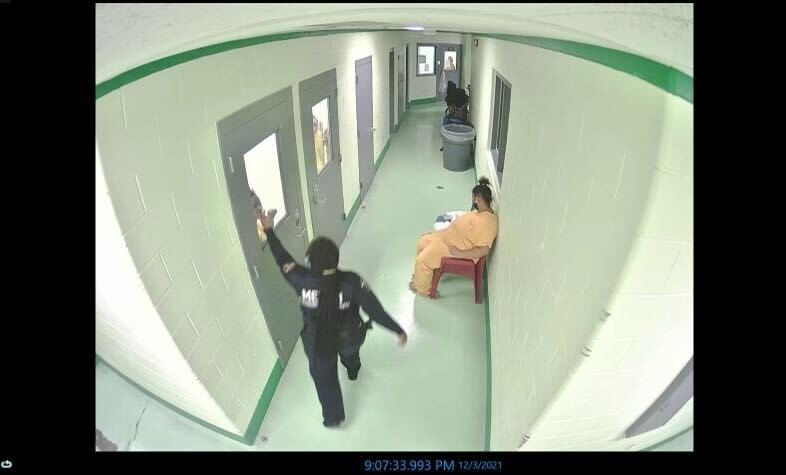For the last 18 hours of her life, Stephanie Dunbar was kept locked in a cramped “attorney booth” at the Louisville jail. Unlike a traditional cell, it lacked a mattress, running water or a toilet. The room wasn’t designed for incarceration, but Metro Corrections sometimes uses the booths when single cells aren’t available and an inmate needs to be segregated from general population.
Dunbar, a 48-year-old Black woman, was homeless at the time she was booked into jail days earlier on Nov. 30 on an assault charge.
Despite policy mandating “detox inmates” like Dunbar be checked on by officers every 20 minutes, an internal investigation found the only time guards had eyes on her for the 18 hours she was confined in the booth was when officers “happened to walk by while conducting other business.” The evening before she hanged herself using a pair of soiled pants, one of those officers gave her the middle finger through the rectangular window of the booth’s door.
A 432-page Louisville Metro Department of Corrections breach of policy investigation into Dunbar’s death provided to LEO Weekly by her family’s attorney ultimately determined that eight officers had not followed the facility’s observation protocol for detoxing inmates. If they had, the report concluded, she may not have died.
“If detox protocol had been followed and Inmate Dunbar had been observed regularly at intervals less than twenty (20) minutes and had a One-on-One watcher to observe her around the clock, the incident may not have occurred or may have been discovered quick enough to change the outcome,” wrote Sgt. Jacob Whidby of LMDC’s Internal Affairs Unit in his investigative report, which was written more than three months ago.
Dunbar was one of eight inmates to die in the custody of Louisville’s troubled jail between late November of last year and late March of this year. During that period of time, there were more deaths at Louisville’s jail than there were at New York City’s Rikers Island, a facility many times larger than LMDC that narrowly avoided federal takeover earlier this year over inmate conditions. At one point, inmates at LMDC were dying at the rate of one roughly every two weeks.
The investigation into Dunbar’s death provides the most complete look to date at the problems at Louisville’s troubled jail at a time when a rush of inmate deaths sparked outrage and urgent calls for reform and accountability.
“The jail has policies and procedures in place that specifically were not followed by the corrections officers in the jail in general. And I think that directly contributed to Miss Dunbar’s death,” said Trenton Burns, the attorney representing Dunbar's family. “It’s pretty clear to me that their failure to observe is the reason why this happened.”
The investigation found that eight LMDC officers violated the department’s observation policy by failing to follow proper protocol for detox inmates. Two of those officers were also found to have forged observation sheets, labeling parts of the jail “all secure” at times when they were elsewhere in the facility. And the officer who gave Dunbar the middle finger was found to have violated LMDC’s code of conduct and code of ethics.
In a statement to LEO Weekly, LMDC spokesman Maj. Darrell Goodlett said that “several officers were disciplined” as a result of the investigation and received suspensions of between two and five days.
Daniel Johnson, the president of the union that represents Metro Corrections officers, told LEO that suspensions were given to the officer who gave Dunbar the middle finger and two officers who forged observation sheets.
The statements by LMDC in response to LEO represent the first time the department has publicly acknowledged that jail officers faced discipline in relation to any of the eight recent inmate deaths.

THE ATTORNEY BOOTH
Dunbar was booked into LMDC on Nov. 30 on an assault charge. She was being held on a $25,000 cash bond.According to Burns, her family’s attorney, she had been living on the street in Louisville for at least months before the arrest. One of her sons would frequently make the 280-mile drive from Chattanooga, Tennessee to bring her food, toiletries and other basic supplies, but she rebuffed his efforts to bring her home, Burns said, insisting on finding her own way.
Burns said the incident that led to Dunbar being taken into LMDC — a stabbing according to court records — was the result of somebody trying to take her belongings.
Documents obtained by LEO earlier this year showed that Dunbar was one of several inmates who died in LMDC after being recommended for release by Pretrial Services. In each case, judges disregarded the recommendation and instead held the defendants on bond.
According to the Metro Corrections Professional Standards Unit investigation, upon processing, medical staff classified Dunbar as an alcohol detox inmate. To identify her as such, she was given a blue armband and listed as a detox inmate in the management software used by the jail.
According to interviews with LMDC officers included in the investigation, after a fight in general population that led to another inmate being sent to the hospital, Dunbar was removed from the dorm area and placed into an “attorney booth,” a small room designed for inmates to meet with their counsel through a large window that sits above a metal ledge.
Security camera footage shared with LEO by Burns showed a woman he identified as Dunbar arguing with another inmate who approached her and then threw a punch at her. The two women tumble to the ground and the woman identified as Dunbar appears to strike the other inmate in the face with her knee.
Additional footage from the previous evening showed several inmates attacking Dunbar after an inmate removed her mattress from a bed and placed it on the floor. The dorm was so crowded that at least five inmates were already sleeping on the floor at the time.
The compact attorney booth rooms like the one Dunbar was placed in have a plastic chair, but no other furniture. Without a toilet or running water, inmates must request to be let out to go to the bathroom or get something to drink. The rooms are not intended as housing, but with only 19 single cells on the female floor of the jail, officers turn to attorney booths as temporary housing while waiting for a single cell to open up or before placing an inmate into a new dorm.
For inmates like Dunbar who are on detox protocol and being housed outside of general population, LMDC policy mandates that they be checked on once every 20 minutes and notes be made on their status. It is also LMDC policy to have a trained inmate “one-on-one watcher” stationed outside of the detox inmate’s door.
The LMDC investigation determined that none of these protocols was followed.
“The only time Inmate Dunbar was observed while secured in the attorney booth was when the officers or sergeants just happened to walk by while conducting other business,” wrote Whidby, the investigator, in his report.
Johnson, the president of jail officers’ union FOP Lodge 77, told LEO that at the time of Dunbar’s death, no “one-on-one watchers” were available.
He pinned the inability to keep watch over Dunbar on the jail’s chronic staff shortages.
“For the last year and a half, I’ve been saying we don't have enough people to do our job,” said Johnson. “I’ve said it in [Metro] Council, I’ve said it on the news, I’ve said it in the newspaper, I’ve said it everywhere. And sure enough we didn't have enough people to get around and monitor somebody and she was able to commit suicide.”
Johnson said the low staffing levels mean officers are often in positions where it is “impossible to supervise everybody adequately.”
He added that inmates are kept in attorney rooms when single cells are full, but that “typically” inmates weren’t held there for 18 hours like Dunbar was.
“That was unusual,” he said.
In a statement to LEO, Goodlett, the LMDC spokesperson, said changes have been made at the jail since Dunbar’s death.
“In the wake of her suicide, a renewed emphasis on mental health and inmate safety is being instilled into the culture of Metro Corrections,” said Goodlett. “Newly appointed Director of Metro Corrections, Jerry Collins, has already made an impact.”
Collins took over as the jail’s boss on April 1. There have been no inmate deaths since then. [Editor’s note: This story was originally published on July 7, 2022. On July 8, another inmate death was reported by LMDC, the first during Collins’s time as the jail's director.]
Goodlett added that Collins had appointed a full-time psychologist to oversee mental health treatment. Speaking at a Metro Council budget hearing in April, Collins said LMDC’s planned fiscal year 2023 budget included funds to increase the number of suicide-resistant cells on the jail’s mental health walk from one to nine and to install video cameras in single cells.

FORGED DOCUMENTS, MIDDLE FINGERS
After Dunbar was first put into the attorney booth on the evening of Dec. 3, corrections officer Shakeara Ware was observed on video giving Dunbar the middle finger as she walked by the meeting room-turned-cell.“I don’t recall it, but I was very upset,” Ware told an investigator in an interview. “Not gonna say it sounds reasonable, but I could have possibly.”
In her interview with an investigator, Ware said she was upset with Dunbar because “she would just start fights” with other inmates and had urinated and defecated “everywhere on purpose” before being placed in the attorney booth.
“To have that kind of reaction towards an inmate just in the course of you doing your job is pretty horrible. So I was pretty discouraged to see that,” said Burns, the attorney for Dunbar's family. “I know there's staffing issues and there’s a lot of different factors in play as far as some of the failures of LMDC as a whole, but you never want to see a corrections officer who’s sworn to protect inmates just casually walk by and give a middle finger to an inmate. It's just beyond inappropriate.”
A little more than an hour before an officer returning from a smoke break saw Dunbar’s body hanging in the attorney booth on the afternoon of Dec. 4, Sgt. Timothy Myers-Angeline entered the room. Myers-Angeline had been assigned to check fire extinguishers, and saw Dunbar standing up on a metal ledge holding her pants up to a vent. Myers-Angeline told an investigator that Dunbar told him she was trying to dry her pants and that he told her to get down from the ledge.
“She was removing her foot and, you know, doing as I asked her to. Didn't seem any, you know, nothing out of the ordinary,” he said, according to the report.
Myers-Angeline left the attorney booth and continued with his duties; the investigation exonerated him of any wrongdoing.
The night before, another officer said they had taken a sheet away from Dunbar in the attorney booth after she was observed doing “weird stuff” with it.
As part of the investigation into Dunbar’s death, two officers, Deidre Cunanan and Gabrielle Webb, were found to have forged observation sheets, declaring specific parts of the jail “all secure” at times when they were captured on video camera in other parts of the facility performing different tasks.
“Officer Webb signed the Dorm 4 observation sheet at 1100 hours and 1132 hours and made the observation ‘AS’ or ‘all secure’ for both times,” Whidby’s investigative report reads, describing one example of the breach of policy. “However, Officer Webb can be seen on video at 1100 hours doing a move list at Dorm 3 and at 1132 hours passing newspapers out to the dorms on the Northside. During both of those times, Officer Webb was not in Dorm 4 or even near Dorm 4.”
Webb told the LMDC investigator she was working on forced overtime — a common occurrence for officers as staffing shortages continue — and was the only person working on the women’s floor of the jail for a time on Dec. 4.
Cunanan provided a similar excuse: “[B]ecause I was the only one on the floor. I mean, I have to do other things. Like, I have to print out sheets. I have other responsibilities.”
Burns, the attorney, said Dunbar’s children regarded her as a strong, resilient and caring woman who had fallen on hard times.
“They just can’t imagine their mom that they know and love, being such a strong woman, succumbing to the horrors of the jail and passing away the way that she did,” he said. “I really think that just kind of highlights the atrocities in the jail as it relates to the jail’s failures, and in this particular case to assist, help, observe, look after, care for Miss Dunbar. It’s really just sad all the way around.”
[Editor’s note: This story is the first in a series about what LEO Weekly has learned about the deaths of Louisville jail inmates. To read Part II, an examination of the failures amid three inmate deaths, please click here.]
Keep Louisville interesting and support LEO Weekly by subscribing to our newsletter here. In return, you’ll receive news with an edge and the latest on where to eat, drink and hang out in Derby City.
Follow us on Facebook, Twitter and Instagram.






